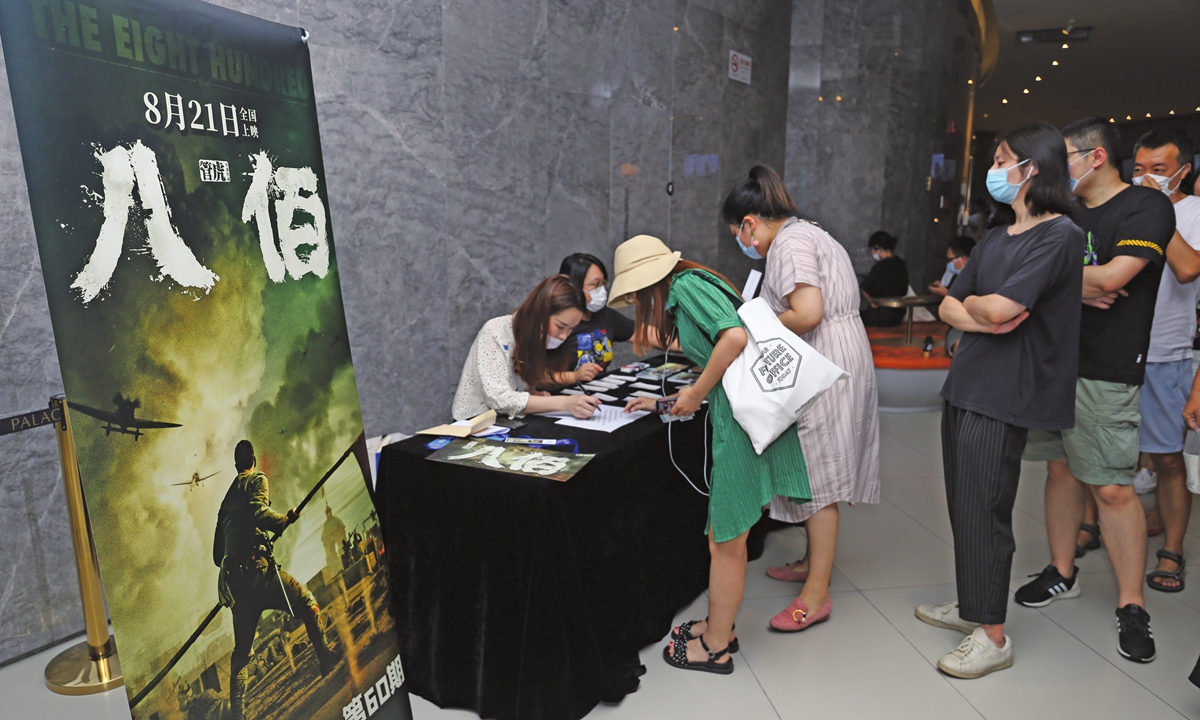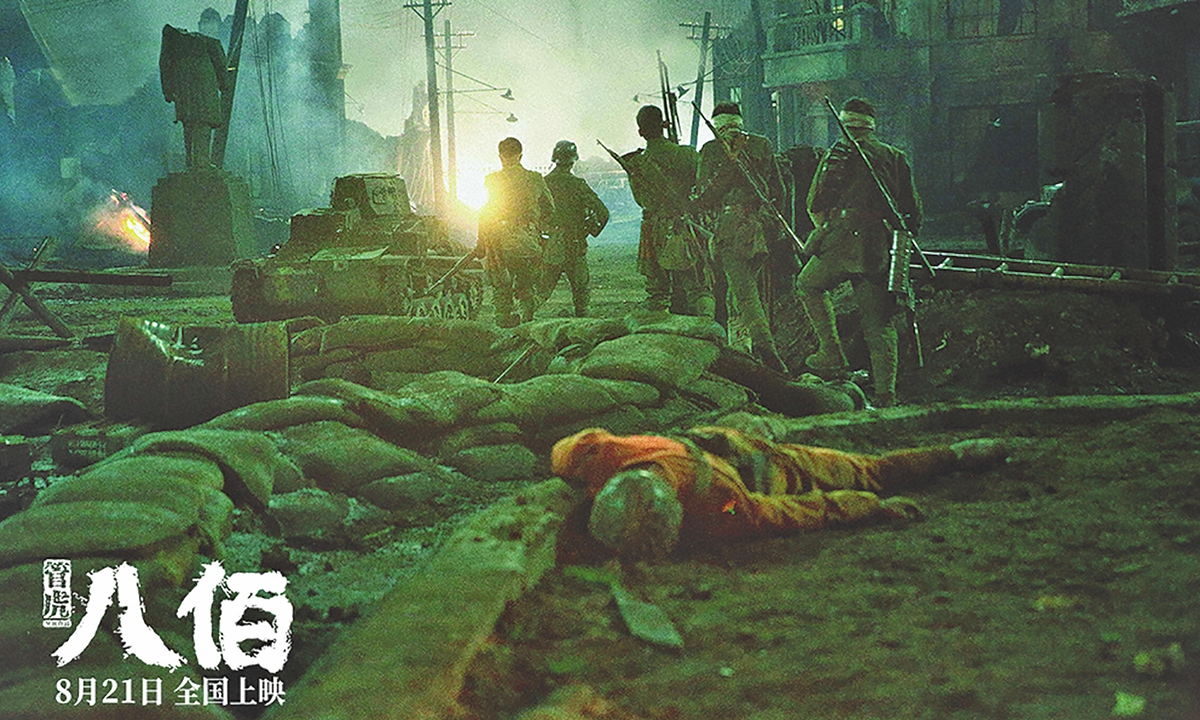Director Guan Hu’s war epic an ode to patriotic soldiers and the great Chinese people
By Ai Pang Source: Global Times Published: 2020/8/16 18:20:53

People line up at a Shanghai cinema for a prescreening of The Eight Hundred on Friday. Photo: IC

Promotional material for The Eight Hundred Photo: IC
As the lights turned back on in the theater, the entire audience - only at 30 percent of capacity due to coronavirus prevention measures - continued to sit motionless in their seats, even long after the screen went dark. They were so shocked and moved by the movie they had just seen - The Eight Hundred, which was prescreened at several cinemas around China on Friday. The film, set for wide release on August 21, is one of the very first new films to hit theaters since Chinese mainland cinemas returned to operation in late July.The film has so far earned an 8.1/10 on Chinese media review platform Douban from prescreening reviews.
The story, about a ragtag group of Chinese soldiers in 1937 Shanghai guarding a warehouse against thousands of highly skilled and well-equipped Japanese troops, is well known throughout the country as it is taught in history textbooks.
Despite this familiarity, after the movie, I, just like these people, had a hard time dragging myself out of the story of these soldiers who, desperate for reinforcements, continued to fight round after round of brutal battles to save the lives of innocent civilians and give hope to the future. Even though it has been 83 years since the battle for the Sihang Warehouse, these 800 soldiers and their courage, sacrifice and patriotism are still capable of touching millions of Chinese people. These 800 heroes remind us to never forget the past, no matter how painful it may be, and to cherish the peace that they fought to bring us.
Heaven or hell
It may have been the strangest battle in the world. A city divided into two sides connected by a bridge. One side is a hell-like war zone with people dying every minute as buildings are bombed into ruins. The other side is a world-renowned modern metropolis like New York with neon lights everywhere, hot dogs, whisky bars, casinos, theaters and people enjoying their lives like the war didn't exist.
The defense of Sihang Warehouse came after Chinese army lost the district of Zhabei. These 800 soldiers were ordered to resist the Japanese army to buy time for the army to retreat and gain international support by showing China's determination to fight during the War of Resistance against Japanese Aggression (1931-45). Located along the Suzhou river, the Sihang Warehouse, used by four banks as a warehouse, was across from the foreign concessions in Shanghai. At the time, the Japanese didn't want to go to war with Europe or US, so they didn't dare call for naval artillery strikes on the area as that could have caused a diplomat incident.
Director Guan Hu did an excellent job presenting the brutal battles that took place during the defense of the warehouse. As a war epic, the film features realistic scenes about war that are both shocking visually and emotionally. Guan made a bold move to make The Eight Hundred the first Chinese film to be entirely shot with IMAX cameras, which makes the war scenes feel so realistic you may find yourself questioning if you have been placed on the battlefield yourself.
Heroes are not born heroes. Just like many of us would do, these soldiers considered running out of that hell, especially since heaven was just across a small river.
But gradually these soldiers come to understand their responsibility and duty to fight for their compatriots, who had supported them for weeks with donations providing them with everything they needed.
Flag of hope
The emotional intensity of the film reaches a peak when China's national flag during the Republic of China era (1912-49) is raised on the top of the warehouse, igniting people's hope that the war against Japanese aggression could be won.
Armed with this hope and the knowledge that there were so many brave soldiers - from local provincial garrisons or the central army to farmers, students and even gangster members - fighting for them, the Chinese people found the determination to carry on and continue the fight of those who sacrificed everything for China.
Most of them were only 16 to 18, much younger than Hong Kong secessionist Agnes Chow, yet they did everything they could, including giving up their very lives, for the survival of the people and their country, while this so-called "real Mulan" Chow has begged on social media for support from Japan, the country that invaded Hong Kong, in these invaders' very own language. Such a shame!
Secessionists like Chow need to go to the cinema to see what Japan did to their grandparents decades ago. Hopefully, they may actually learn something from the movie if their blood still carries a bit of sense of being Chinese.
Jointly produced by major Chinese studios like Huayi Brothers and Tencent Pictures, the film began prescreening on Friday evening, the day before the anniversary of Japan's surrender. It not only reminds Chinese of our bitter memories of the invasion and massacres Japan carried out here, but also lifts our spirits and confidence at a time when people's lives have been hit hard by the COVID-19 epidemic.
At last, a special thanks and respect must be given to director Guan and all the people behind the film. Your efforts and work have made this defense and the sacrifice of these 800 heroes more meaningful.
"I will visit the museum in Shanghai to remember them," murmured one audience member sitting in front of me.
Newspaper headline: ‘The Eight Hundred’